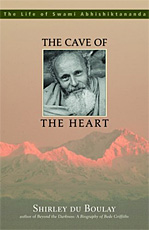"For years he had longed for this moment, lived for it, suffered for it; yet now it had arrived and it was so simple. 'The discovery that the AWAKENING has nothing to do with any situation, even so-called life or so-called death; one is awake, and that is all.' 'It is at the same time a wonderful experience of "cruising" between death and life, discovering that one IS!' Sometimes he expanded his thinking, for instance, on the distinction between notion and experience and how even after his own awakening experience 'I can only aim at awakening people to what "they are." Anything about God or the Word in any religion, which is not based on the deep I-experience is bound to be simply "notion," not existential. From the awakening to self comes the awakening to God — and we discover marvelously that Christ is simply this awakening on a degree of purity rarely if ever reached by man.'
"Mostly it is sheer joy that he wanted to communicate. 'It is wonderful to pass through such an experience which makes you find full peace and happiness beyond all situations, even of death and life. Life cannot be the same any more, because beyond life we have found the Awakening.' Sometimes a single phrase was enough: 'The awakening alone is what counts.'
"If there was one theme, apart from his overabundant joy, that concerned him, it was Christ and the church. During twenty-five years of seeking the unifying point between Christianity and advaita, Abhishiktananda had often found it a struggle to remain a Christian and was increasingly disenchanted with the church. He felt that the current crisis in the church was even deeper than was generally thought, but 'when seen from the Himalayas, how mean and petty sound the arguments of radicals and reactionaries alike!' He saw advaita as 'the specific, if not the only, way by which the Church may survive its appalling crisis.' Yet, as early as 1956 he had written that true advaita, 'blows up the institutional Church of the Vatican.' The frequency with which he writes of the church shows his concern, yet he was curiously indifferent to its fate, for instance, saying, 'The structures will blow up, but what does it matter? There are plenty of tracks leading to the summit of Arunachala!'. . .
"But he never wavered in his love for Christ. His 'double-belonging' had cost him bitterly, but eventually he was rewarded with dazzling revelations of the truth beyond the opposites; he had also found the reconciliation, in himself, of Christianity and Hinduism. In 1972 he was able to write: 'the Christian experience is truly the Advaitic experience lived in the human communion.' Now, these few months after his heart attack, he was flooded with new understandings about Christ, many of them contained in two letters to Murray Rogers, at the time living in Jerusalem and unable to visit him in the nursing home.
"The catalyst to these thoughts was the invitation he had received earlier in the year from Pir Vilayat Inayat Khan. The Sufi was keen for Abhishiktananda to attend a youth camp in Chamonix and Abhishiktananda was under pressure from some of his friends to go. Clearly now his health ruled out acceptance, but the idea, accompanied, he admitted, by some slight temptation to accept, seems to have clarified his thoughts on Christ. He realized how concerned he was that he could no longer speak for the average Christian:
" 'The further I go, the less able I would be to present Christ in a way which would still be considered as "Christian." . . . I am interested in no Christo-theology at all. I have so little interest in a word of God which will awaken man within history. . . . The "Word of God" comes from/to my own "present"; it is that very awakening which is my self-awareness. What I discover above all in Christ is his "I AM." ' "
